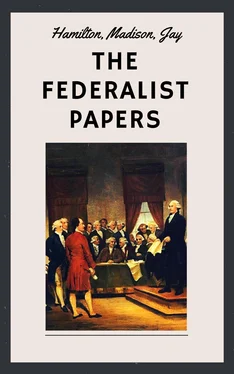The variety of more minute interests, which will necessarily fall under the superintendence of the local administrations, and which will form so many rivulets of influence, running through every part of the society, cannot be particularized, without involving a detail too tedious and uninteresting to compensate for the instruction it might afford.
There is one transcendant advantage belonging to the province of the State governments, which alone suffices to place the matter in a clear and satisfactory light,—I mean the ordinary administration of criminal and civil justice. This, of all others, is the most powerful, most universal, and most attractive source of popular obedience and attachment. It is that which, being the immediate and visible guardian of life and property, having its benefits and its terrors in constant activity before the public eye, regulating all those personal interests and familiar concerns to which the sensibility of individuals is more immediately awake, contributes, more than any other circumstance, to impressing upon the minds of the people, affection, esteem, and reverence towards the government. This great cement of society, which will diffuse itself almost wholly through the channels of the particular governments, independent of all other causes of influence, would insure them so decided an empire over their respective citizens as to render them at all times a complete counterpoise, and, not unfrequently, dangerous rivals to the power of the Union.
The operations of the national government, on the other hand, falling less immediately under the observation of the mass of the citizens, the benefits derived from it will chiefly be perceived and attended to by speculative men. Relating to more general interests, they will be less apt to come home to the feelings of the people; and, in proportion, less likely to inspire an habitual sense of obligation, and an active sentiment of attachment.
The reasoning on this head has been abundantly exemplified by the experience of all federal constitutions with which we are acquainted, and of all others which have borne the least analogy to them.
Though the ancient feudal systems were not, strictly speaking, confederacies, yet they partook of the nature of that species of association. There was a common head, chieftain, or sovereign, whose authority extended over the whole nation; and a number of subordinate vassals, or feudatories, who had large portions of land allotted to them, and numerous trains of INFERIOR vassals or retainers, who occupied and cultivated that land upon the tenure of fealty or obedience, to the persons of whom they held it. Each principal vassal was a kind of sovereign, within his particular demesnes. The consequences of this situation were a continual opposition to authority of the sovereign, and frequent wars between the great barons or chief feudatories themselves. The power of the head of the nation was commonly too weak, either to preserve the public peace, or to protect the people against the oppressions of their immediate lords. This period of European affairs is emphatically styled by historians, the times of feudal anarchy.
When the sovereign happened to be a man of vigorous and warlike temper and of superior abilities, he would acquire a personal weight and influence, which answered, for the time, the purpose of a more regular authority. But in general, the power of the barons triumphed over that of the prince; and in many instances his dominion was entirely thrown off, and the great fiefs were erected into independent principalities or States. In those instances in which the monarch finally prevailed over his vassals, his success was chiefly owing to the tyranny of those vassals over their dependents. The barons, or nobles, equally the enemies of the sovereign and the oppressors of the common people, were dreaded and detested by both; till mutual danger and mutual interest effected a union between them fatal to the power of the aristocracy. Had the nobles, by a conduct of clemency and justice, preserved the fidelity and devotion of their retainers and followers, the contests between them and the prince must almost always have ended in their favor, and in the abridgment or subversion of the royal authority.
This is not an assertion founded merely in speculation or conjecture. Among other illustrations of its truth which might be cited, Scotland will furnish a cogent example. The spirit of clanship which was, at an early day, introduced into that kingdom, uniting the nobles and their dependants by ties equivalent to those of kindred, rendered the aristocracy a constant overmatch for the power of the monarch, till the incorporation with England subdued its fierce and ungovernable spirit, and reduced it within those rules of subordination which a more rational and more energetic system of civil polity had previously established in the latter kingdom.
The separate governments in a confederacy may aptly be compared with the feudal baronies; with this advantage in their favor, that from the reasons already explained, they will generally possess the confidence and good-will of the people, and with so important a support, will be able effectually to oppose all encroachments of the national government. It will be well if they are not able to counteract its legitimate and necessary authority. The points of similitude consist in the rivalship of power, applicable to both, and in the CONCENTRATION of large portions of the strength of the community into particular DEPOSITORIES, in one case at the disposal of individuals, in the other case at the disposal of political bodies.
A concise review of the events that have attended confederate governments will further illustrate this important doctrine; an inattention to which has been the great source of our political mistakes, and has given our jealousy a direction to the wrong side. This review shall form the subject of some ensuing papers.
PUBLIUS
FEDERALIST No. 18. The Same Subject Continued (The Insufficiency of the Present Confederation to Preserve the Union)
For the New York Packet. Friday, December 7, 1787
MADISON, with HAMILTON
To the People of the State of New York:
AMONG the confederacies of antiquity, the most considerable was that of the Grecian republics, associated under the Amphictyonic council. From the best accounts transmitted of this celebrated institution, it bore a very instructive analogy to the present Confederation of the American States.
The members retained the character of independent and sovereign states, and had equal votes in the federal council. This council had a general authority to propose and resolve whatever it judged necessary for the common welfare of Greece; to declare and carry on war; to decide, in the last resort, all controversies between the members; to fine the aggressing party; to employ the whole force of the confederacy against the disobedient; to admit new members. The Amphictyons were the guardians of religion, and of the immense riches belonging to the temple of Delphos, where they had the right of jurisdiction in controversies between the inhabitants and those who came to consult the oracle. As a further provision for the efficacy of the federal powers, they took an oath mutually to defend and protect the united cities, to punish the violators of this oath, and to inflict vengeance on sacrilegious despoilers of the temple.
In theory, and upon paper, this apparatus of powers seems amply sufficient for all general purposes. In several material instances, they exceed the powers enumerated in the articles of confederation. The Amphictyons had in their hands the superstition of the times, one of the principal engines by which government was then maintained; they had a declared authority to use coercion against refractory cities, and were bound by oath to exert this authority on the necessary occasions.
Читать дальше












